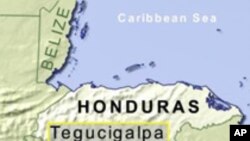<!-- IMAGE -->The interim Honduran government has lifted a week-old emergency decree that had restricted civil liberties.
Interim President Roberto Micheletti made the announcement Monday, telling a news conference in Tegucigalpa "the decree is completely overturned."
Earlier, he was quoted as saying the decree is no longer necessary because "we have peace in the country." The revocation order is expected to take effect when it is published in the government's official gazette.
Mr. Micheletti has been under international pressure to restore the civil liberties and negotiate an end to the political crisis stemming from the ouster of President Manuel Zelaya in a June 28 coup.
The interim president imposed the restrictions as protesters rallied in Tegucigalpa following the surprise return September 21 of Mr. Zelaya, who is now holed up in the Brazilian embassy.
The decree allowed the de facto government to shut down pro-Zelaya media outlets and ban unauthorized meetings. It also allowed police to make arrests without warrants. The emergency restrictions triggered a wave of international condemnation. Supporters of Mr. Zelaya demanded that the decree be lifted before the two sides hold talks.
A mission from the Organization of American States arrives in Honduras Wednesday for meetings on the political crisis.
Separately, three Republican South Florida U.S. representatives - Ileana Ros-Lehtinen and brothers Lincoln and Mario Diaz-Balart - traveled to Honduras Monday for meetings with interim government officials.
Last week, another delegation of Republican lawmakers defied the Obama administration's position of trying to isolate the de facto government and flew to Honduras for talks with Mr. Micheletti. South Carolina Senator Jim DeMint led the four-person delegation.
The United States and other nations have condemned Mr. Zelaya's overthrow. Washington also has revoked the visas of Honduran officials and has cut aid to the Central American country. Many conservative U.S. lawmakers have criticized President Barack Obama's support of Mr. Zelaya.
The de facto government says Mr. Zelaya was ousted because he was trying to illegally change the constitution to extend his term in office.
Interim President Roberto Micheletti made the announcement Monday, telling a news conference in Tegucigalpa "the decree is completely overturned."
Earlier, he was quoted as saying the decree is no longer necessary because "we have peace in the country." The revocation order is expected to take effect when it is published in the government's official gazette.
Mr. Micheletti has been under international pressure to restore the civil liberties and negotiate an end to the political crisis stemming from the ouster of President Manuel Zelaya in a June 28 coup.
The interim president imposed the restrictions as protesters rallied in Tegucigalpa following the surprise return September 21 of Mr. Zelaya, who is now holed up in the Brazilian embassy.
The decree allowed the de facto government to shut down pro-Zelaya media outlets and ban unauthorized meetings. It also allowed police to make arrests without warrants. The emergency restrictions triggered a wave of international condemnation. Supporters of Mr. Zelaya demanded that the decree be lifted before the two sides hold talks.
A mission from the Organization of American States arrives in Honduras Wednesday for meetings on the political crisis.
Separately, three Republican South Florida U.S. representatives - Ileana Ros-Lehtinen and brothers Lincoln and Mario Diaz-Balart - traveled to Honduras Monday for meetings with interim government officials.
Last week, another delegation of Republican lawmakers defied the Obama administration's position of trying to isolate the de facto government and flew to Honduras for talks with Mr. Micheletti. South Carolina Senator Jim DeMint led the four-person delegation.
The United States and other nations have condemned Mr. Zelaya's overthrow. Washington also has revoked the visas of Honduran officials and has cut aid to the Central American country. Many conservative U.S. lawmakers have criticized President Barack Obama's support of Mr. Zelaya.
The de facto government says Mr. Zelaya was ousted because he was trying to illegally change the constitution to extend his term in office.
Some information for this report was provided by AP and Reuters.




